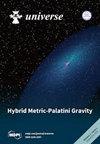Effects of Two Quantum Correction Parameters on Chaotic Dynamics of Particles Near Renormalized Group Improved Schwarzschild Black Holes
IF 2.5
4区 物理与天体物理
Q2 ASTRONOMY & ASTROPHYSICS
引用次数: 0
Abstract
A renormalized group improved Schwarzschild black hole spacetime contains two quantum correction parameters. One parameter γ represents the identification of cutoff of the distance scale, and another parameter Ω stems from nonperturbative renormalization group theory. The two parameters are constrained by the data from the shadow of M87* central black hole. The dynamics of electrically charged test particles around the black hole are integrable. However, when the black hole is immersed in an external asymptotically uniform magnetic field, the dynamics are not integrable and may allow for the occurrence of chaos. Employing an explicit symplectic integrator, we survey the contributions of the two parameters to the chaotic dynamical behavior. It is found that a small change of the parameter γ constrained by the shadow of M87* black hole has an almost negligible effect on the dynamical transition of particles from order to chaos. However, a small decrease in the parameter Ω leads to an enhancement in the strength of chaos from the global phase space structure. A theoretical interpretation is given to the different contributions. The term with the parameter Ω dominates the term with the parameter γ, even if the two parameters have same values. In particular, the parameter Ω acts as a repulsive force, and its decrease means a weakening of the repulsive force or equivalently enhancing the attractive force from the black hole. On the other hand, there is a positive Lyapunov exponent that is universally given by the surface gravity of the black hole when Ω ≥ 0 is small and the external magnetic field vanishes. In this case, the horizon would influence chaotic behavior in the motion of charged particles around the black hole surrounded by the external magnetic field. This point can explain why a smaller value of the renormalization group parameter would much easily induce chaos than a larger value.两个量子修正参数对归一化改进组施瓦兹柴尔德黑洞附近粒子混沌动力学的影响
重正化群改进的施瓦兹柴尔德黑洞时空包含两个量子修正参数。一个参数γ代表距离尺度截止的识别,另一个参数Ω源自非微扰重正化群理论。这两个参数受到 M87* 中心黑洞阴影数据的约束。黑洞周围带电测试粒子的动力学是可积分的。然而,当黑洞沉浸在外部渐近均匀磁场中时,动力学就不可积分,可能会出现混沌。利用显式交映积分器,我们研究了两个参数对混沌动力学行为的贡献。研究发现,在 M87* 黑洞阴影的约束下,参数 γ 的微小变化对粒子从有序到混沌的动力学转变的影响几乎可以忽略不计。然而,从全局相空间结构来看,参数ω的微小减小会导致混沌强度的增强。我们对不同的贡献给出了理论解释。即使参数 Ω 和参数 γ 的值相同,参数 Ω 项也会支配参数 γ 项。特别是,参数 Ω 起着斥力的作用,它的减小意味着斥力的减弱或黑洞吸引力的增强。另一方面,当 Ω ≥ 0 很小时,外部磁场消失,黑洞表面引力普遍给出了一个正的李雅普诺夫指数。在这种情况下,地平线会影响被外磁场包围的黑洞周围带电粒子运动的混乱行为。这一点可以解释为什么较小的重正化群参数值比较大的参数值更容易引起混沌。
本文章由计算机程序翻译,如有差异,请以英文原文为准。
求助全文
约1分钟内获得全文
求助全文
来源期刊

Universe
Physics and Astronomy-General Physics and Astronomy
CiteScore
4.30
自引率
17.20%
发文量
562
审稿时长
24.38 days
期刊介绍:
Universe (ISSN 2218-1997) is an international peer-reviewed open access journal focused on fundamental principles in physics. It publishes reviews, research papers, communications, conference reports and short notes. Our aim is to encourage scientists to publish their research results in as much detail as possible. There is no restriction on the length of the papers.
 求助内容:
求助内容: 应助结果提醒方式:
应助结果提醒方式:


